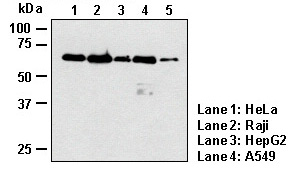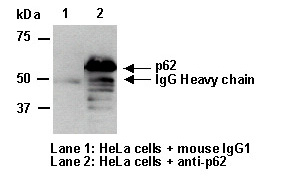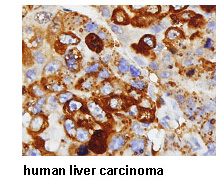- Japan(Japanese / English)
- Global
- MBL TOP
- MBL site search
Close
This site is for customers in Japan.
Customers in other regions, please go to Global page.
HOME >
Product search results > Code No. M162-3
Anti-p62 (SQSTM1) (Human) mAb
Price
¥52,800
Availability (in Japan)
10 or more
(In Japan at 00:05,
Apr 17, 2024 in JST)
Size
100 µL (1 mg/mL)
| Data | |||||
|---|---|---|---|---|---|
| Clonality | Monoclonal | Clone | 5F2 | ||
| Isotype (Immunized Animal) | Mouse IgG1 κ | ||||
| Applications | |||||
| Immunogen (Antigen) | Recombinant Human p62 (120-440 a.a.) | ||||
| Reactivity [Gene ID] | Human[8878], Mouse(-), Rat(-), Hamster(-) |
||||
| Storage buffer | 1 mg/mL in PBS/50% glycerol, pH 7.2 | ||||
| Storage temp. | -20°C | Conjugate | Unlabeled | Manufacturer | MBL |
| Alternative names | sequestosome 1, p60, p62, A170, OSIL, PDB3, ZIP3, p62B | ||||
| Background | p62/SQSTM1 interacts with various molecular groups such as RIP, TRAF6, ERK, aPKCs, and poly-ubiquitin through PB1 domain, Zn finger domain, and UBA domain. This protein directly interacts with LC3, which is localized on autophagosome membrane, and is degradated by autophagic-lysosome pathway. p62 regulates ubiquitin-positive protein aggregates caused by autophagy deficiency. | ||||
| Related products | PM045 Anti-p62 (SQSTM1) pAb M162-A48 Anti-p62 (SQSTM1) (Human) mAb-Alexa Fluor™ 488 M162-A59 Anti-p62 (SQSTM1) (Human) mAb-Alexa Fluor™ 594 M162-A64 Anti-p62 (SQSTM1) (Human) mAb-Alexa Fluor™ 647 PM066 Anti-p62 C-terminal pAb PM036 Anti-LC3 pAb M152-3 Anti-LC3 mAb M186-3 Anti-LC3 mAb PD014 Anti-LC3 pAb PM069 Anti-NRF2 pAb PM072 Anti-VMP1 pAb 8485 Autophagy Ab Sampler Set PM090 Anti-Atg8 (Filamentous fungi) pAb D343-3 Anti-Phospho-p62 (SQSTM1) (Ser403) mAb D344-3 Anti-Phospho-p62 (SQSTM1) (Ser403) mAb PM074 Anti-Phospho-p62 (SQSTM1) (Ser351) pAb M224-3 Anti-KEAP1 mAb M200-3 Anti-NRF2 mAb D343-3MS Anti-Phospho-p62 (SQSTM1) (Ser403) mAb for My select sampler set D344-3MS Anti-Phospho-p62 (SQSTM1) (Ser403) mAb for My select sampler set M152-3MS Anti-LC3 mAb for My select sampler set PM074MS Anti-Phospho-p62 (SQSTM1) (Ser351) pAb for My select sampler set M230-3 Anti-Parkin mAb PM037 Anti-GABARAP pAb 8486 Autophagy Watch M135-3 Anti-GABARAP mAb M217-3 Anti-Phospho-p62 (SQSTM1) (Ser351) mAb M217-3MS Anti-Phospho-p62 (SQSTM1) (Ser351) mAb for My select sampler set PM038 Anti-GATE-16 pAb MK-12-3 Anti-Ubiquitin mAb CY-7055 CycLex® Total p62 ELISA Kit |
||||
| Citations |
Western Blotting
Immunoprecipitation
Immunocytochemistry
Immunohistochemistry
|
||||
| Product category |
|
||||
- The availability is based on the information in Japan at 00:05, Apr 17, 2024 in JST.
- The special price is shown in red color.
- Please note that products cannot be ordered from this website. To purchase the items listed in this website, please contact us or local distributers.
- Abbreviations for applications:
WB: Western Blotting, IH: Immunohistochemistry, IC: Immunocytochemistry, IP: Immunoprecipitation
FCM: Flow Cytometry, NT: Neutralization, IF: Immunofluorescence, RIP: RNP Immunoprecipitation
ChIP: Chromatin Immunoprecipitation, CoIP: Co-Immunoprecipitation
DB: Dot Blotting, NB: Northern Blotting, RNA FISH: RNA Fluorescence in situ hybridization - For applications and reactivity:
*: The use is reported in a research article (Not tested by MBL). Please check the data sheet for detailed information.
**: The use is reported from the licenser (Under evaluation or not tested by MBL).
- For storage temparature: RT: room temparature
- Please note that products in this website might be changed or discontinued without notification in advance for quality improvement.












 Citations
Citations Data Sheet
Data Sheet






